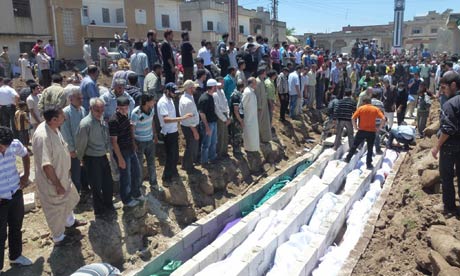Russia and China vote against call for international criminal probe against Assad regime
Martin Chulov in Beirut
guardian.co.uk, Friday 1 June 2012 19.19 BST

Houla: a mass grave for victims of massacre – Syrian forces are accused of killing over 100 people, including women and children. Photograph: AFP
The UN's' top human rights body has overwhelmingly voted to condemnSyria for the massacre in the town of Houla one week ago and called for an international criminal inquiry into what took place.
The resolution, approved by 41 countries – with Russia, China and Cuba voting against – blames pro-regime militias and government troops for the deaths of more than 108 people in the central Syrian town, most of them women and children.
The UN body supported preliminary findings by international monitors who visited Houla and added to a groundswell of international criticism against Damascus , which denies its forces were responsible.
The vote followed a day of increased diplomatic rhetoric against the Syrian regime, coupled with fears that the 16-month crisis is now rapidly leading towards a broader sectarian conflict that will drag in other countries.
The US and Russia are increasingly at loggerheads about who is to blame for the deteriorating situation and what to do about it. The two countries traded barbs on Friday as ecretary of State HilaryHillary Clinton accused Moscow of providing weapons and cover for regime killings.
"The continued supply of arms from Russia has strengthened the Assad regime," the US secretary of state said. And by maintaining this trade it has "raised serious concerns".
Russian officials denied the allegations and dashed western hopes that the Houla massacre may have affected support for its key strategic ally. "Russia is not delivering any weapons that could be used in a civil war," said President Vladimir Putin. A Russian foreign ministry spokesman later described the Houla killings as a "well-planned act by militants" who had been supplied with contraband weapons.
The UN secretary general, Ban Ki-Moon, said on Friday night that "bolder steps" were urgently needed in dealing with Syria, which has been buffeted by trade sanctions, but has faced no real threat of a Libya-style military intervention since the uprising began in March last year.
William Hague, the foreign secretary, said the situation was "now so grave, so serious and so rapidly deteriorating" that no option for international action can be ruled out.
However, Whitehall is not thought to have received any recent instructions to work on a military plan. Nato has repeatedly ruled out sending its forces to Syria. Meanwhile, Sunni Arab states Saudi Arabia and Qatar have supported sending arms to opposition fighters but have told western officials that they would not launch military attacks without the direct involvement of US or European states.
The UN's human rights chief, Navi Pillay, on Friday warned of all-out civil war and repeated her request for the security council to refer the Assad regime to the international criminal court. Echoing concerns about a spillover into neighbouring states, especially Lebanon and Iraq, Pillay told the 47-member UN Human Rights Council that "the situation in Syria might descend into a full-fledged conflict and the future of the country, as well as the region as a whole could be in grave danger".
A peace plan sponsored by the UN and the Arab League and brokered by special envoy to Syria continued to falter on Friday. Activists said that more than 40 people were killed in nationwide violence, much of it centred in Homs province.
Neither regime forces, nor the opposition Free Syria Army have abided by the plan, which called for the regime to stop using heavy weapons and for fighters to pull back from civilian areas.
Syria has said it will back an international inquiry into what took place in Houla as well as two subsequent mass killings. It claimed that foreign-backed Islamists managed to infiltrate the hinterland surrounding Houla and launch an attack on its residents.
Houla residents have insisted that the attackers came from neighbouring Allawite villages and were members of a fiercely loyal regime militia known as the Shabiha.
The US described Damascus's claims as a "blatant lie" and accused the Shabiha of carrying out numerous atrocities throughout the crackdown, which according to some estimates has claimed at least 12,000 lives.
http://samotalis.blogspot.com/
No comments:
Post a Comment